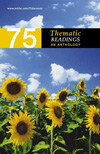
Stephen Jay Gould |  |
Stephen Jay GouldStephen Jay Gould, "Darwin's Middle Road" Stephen Jay Gould (1941-2002) was born in New York City and earned an
A.B. in 1963 from Antioch College and a Ph.D. from Columbia University
in 1967. He was a professor of zoology at Harvard University from 1967
until 2002, specializing in evolutionary theory, geology, and the history
of science. His books include Ever Since Darwin: Reflections inNatural History (1977), The Mismeasure of Man (1981), Bully
for Brontosaurus: Reflections in Natural History (1991), and The
Structure of Evolutionary Theory (2002). Gould also contributed frequently
to periodicals, such as Forbes, the NewYork Times,
and American Heritage, and for years wrote a monthly column called
"This View of Life" for Natural History. Among his numerous
awards and honors are a MacArthur Foundation Prize Fellowship and a National
Book Award for The Panda's Thumb: More Reflections in Natural History
(1980). Gould died of lung cancer in New York City. "Darwin's Middle
Road," a synthesis of two competing views about the nature of scientific
creativity, was first published in Natural History in 1979 and
reprinted in The Panda's Thumb. | QUESTIONS FOR DISCUSSION | CONTENT - Describe Charles Darwin's experiences at college.
- What are "Darwin's finches"?
- Why does the author find Charles Darwin a particularly good choice
to examine within the context of this essay?
- What major criticism of inductivism does the author point out?
- In paragraph three, in what two ways does Gould characterize the
nature of scientific creativity?
- Who are Odysseus, Scylla, Charybdis, and Archimedes? What roles
do they play in this essay?
- Explain the title of this piece. How can Darwin been seen to be
taking the "middle road"?
STRATEGY AND STYLE - Review your answer to content question
f.) above. How effectively does the author tie in his analogy from mythology
to his ideas about scientific creativity? How effective do you find
this introduction? Where in the essay does he come back to this analogy?
- Discuss this piece as a division/classification essay. What's the
major division the author makes and what types of support go into the
classifying parts? Do you find his support persuasive?
- In paragraph fifteen Gould provides a long quotation from Darwin's
autobiography. What are some the advantages of providing this lengthy
quote in one place as opposed to cutting up the writing and discussing
it bit by bit?
- Gould points out an irony in paragraph twenty-five. Explain the
nature of the irony, and how it links his thoughts about Darwin and
Adam Smith.
| ENGAGING THE TEXT | - Do you often find yourself taking the middle ground, or are you
drawn to extremes? Does the situation matter? Can you tie in any of
these feelings to your reading?
- Who do you think about when you think about genius? What names
come to mind? What did they do? Did your thoughts here have any impact
on your experience of reading this piece?
| SUGGESTIONS FOR SUSTAINED WRITING | - Write a comparison/contrast essay using Gould's work and either
Lewis Thomas's "The Lives of a Cell," Adam Smith's, "Of
the Principle of the Commercial, Mercantile System," or Edward
O. Wilson's "Is Humanity Suicidal?" as the other source.
- "Fortune favors the prepared mind" is a saying Gould
uses in his conclusion. Write an essay using that saying as your thesis.
Draw your support from your reading and your own experiences.
| FOR FURTHER RESEARCH | Gould writes that "great thinkers cannot be divorced from their
social background." Pick a great thinker represented in your text—Maya
Angelou, Thomas Jefferson, Martin Luther King Jr., Plato, Virginia Woolf—and
do some research about her or his social background. How did this background
interact with your subject's thinking? | WEB CONNECTION | Did your reading of Gould's work whet your appetite for more information
about natural science? The Academy of Natural Sciences has a wonderful
site to peruse; this is its homepage. | LINKS | Biographical Looking for a place to start researching Gould's life? This biography
at the Stanford Presidential Lectures and Symposia in the Humanities
and Arts pages is a great starting point. You'll also find a photo and
some links there. Want to do some biographical research here, but want options about
where to begin? Try the Google.com web directory
for Gould and you'll get some good ideas. Do you prefer a standalone approach in a biography? Here's a brief
bio from Encyclopedia.com that contains a few hyperlinks.
Bibliographical You've read some of Gould's work. Ready for more? Here's an essay
of his called "Darwinian
Fundamentalism" from The New York Review of Books. The
title is a play on words. Did you notice? How about a more personal slant? In the early 1980s Gould battled
abdominal mesothelioma, a particularly horrible asbestos-related cancer.
Read
more about it at Phoenix5.org. On a much lighter note, here's a chat
first published in the New York Times about Gould's work Ontogeny
and Phylogeny and his fondness for airline coffee cups. (Free registration
required.)
Cultural You're interested in evolution, but aren't sure how to narrow the
topic? These links
courtesy of Harvard University should give you plenty of good ideas. For an opposing view, take a look at this page
about the evolution controversy. What, basically, is the Creationists'
position? Are you into dinosaurs? Steven Jay Gould certainly was. There's
a fun site at U.C. Berkeley called The
Dinosauria that, among many other things, dispels dinosaur myths
and features special exhibits.
|
|
|
|